- Home
- Roy J. Snell
Don Hale with the Flying Squadron Page 3
Don Hale with the Flying Squadron Read online
Page 3
CHAPTER II--NEW COMRADES
A pleasant refreshing breeze was springing up as Don Hale, with hischum, left headquarters and hastened toward the barracks which was to behis temporary home.
There were plenty of signs of life about the great plateau, andoccasionally voices came over the air from the distance with peculiardistinctness. By this time all nature had become gray and sombre, andthe slowly advancing shadows which heralded the approach of dusk wereenveloping the distant hangars and tents and merging the vast, sweepingline of the horizon almost imperceptibly into the coldish tones of thesky.
Here and there lights were beginning to flash into view. From barrackwindows, from tents and outbuildings, they shone--each little sparkling,star-like beam carrying with it a message of good cheer and welcome.
Just before Don and George reached the barracks designated by TomDorsey, over the door of which was painted in very large black letters"Hotel d'Amerique," a loud and lusty chorus, composed of French andAmerican voices, accompanied by a piano, started up, singing withludicrous effect:
"The Yanks are Coming."
Then, as the last words were carried off on the breeze, the momentarysilence that ensued was broken by a loud-voiced student standing by thewindow, who bawled:
"True enough, boys!--the Yanks are not only coming, but they're here."
The aviators immediately crowded to the window, and even before Don andGeorge entered the building, which was to the accompaniment of thatwell-known classic: "Hail, hail! The gang's all here!" they had receiveda noisy and good-natured welcome.
A smiling and dapper little Frenchman was the first to shake them by thehand; and having performed this act with much gravity he immediatelystruck an attitude and began to recite, in the manner of a schoolboy whohas memorized a piece:
"Gentlemens, excuse the bleatings of a little chump who should remainsilent before he speaks. Permit me to say, however, that you may use meas a doormat when it is your will and I shall be overwhelmed with joy.And now having bored you to tears I will desist."
He ended the oration, which some of the fun-loving, mischievousAmericans had taught him, with a low bow, evidently much surprised atthe chuckles and gurgles of mirth which ran through the room.
Don Hale laughingly made a speech in reply, quite astonishing theFrenchmen present by his ready command of their tongue.
And during it all he had been observing his new home with keen curiosityand lively interest. The interior of the long but rather low woodenstructure was whitewashed, and ranged alongside each wall were rows ofbeds. They were makeshift affairs, however, consisting of a couple ofsawhorses with a plank thrown across. Over the top had been placed amattress, looking as though it had done long and valiant service.
"Clearly, the _eleves_ are expected to rough it a bit," thought Don.
It would be a strange boy indeed, however, who objected to roughingit--Don Hale, at least, was not one of that kind.
The lad was glad to discover that the room was evidently occupied byFrenchmen, as well as by his own compatriots. At one end large postersmade by some of the best known artists of France adorned the wall, whileat the other were pictures clearly of American origin.
Tom Dorsey made the introductions, adding a word or two, in a jocularfashion, about the characteristics of each. Very naturally, the newstudent took a decided interest in studying the Americans with whom hewould be so closely associated during the weeks to come.
"Among those present" were men of striking dissimilarities inappearance--of widely different stations in life--of various degrees ofwealth; but the call of adventure, having brought them all together, hadalso served to unite them in a common spirit of comradeship perhapsimpossible under other circumstances. There was, for instance, DaveCornwell, of New York, of the beau monde of Fifth Avenue, witharistocracy imprinted unmistakably on his clean-cut features. And instriking contrast to him was Sid Marlow, cowpuncher of Montana, deckhand on a Mississippi steamboat, longshoreman, and, lastly, fighter inthe Foreign Legion. In fact, the majority of the American _eleves_ hadseen service in that famous branch of the French army, which hadrecruited its members from all parts of the world. No embarrassingquestions were asked; an applicant's antecedents mattered little; he wasgiven a chance to retrieve whatever mistakes he may have made, and,perhaps, through the fiery ordeal of battle, come out a vastly superiorman.
Several of the students particularly attracted Don Hale's attention, oneof them being T. Singleton Albert, referred to by his companions as"Drugstore"; for he had at one time been a drugstore clerk andsoda-water dispenser in Syracuse. Albert was a rather effeminate lookinglittle chap, who seemed wholly out of place in an aviation school. Heappeared diffident to the point of shyness, and his voice, delicate andrefined, was seldom heard. Don Hale wondered if he would ever make aflyer, a profession in which courage and daring are such primerequisites.
Another boy who interested the new student greatly was Bobby Dunlap, whohad had the singular cognomen of "Peur Jamais" thrust upon him. TomDorsey airily explained that on one occasion a student had demanded inFrench of Bobby if he experienced fear during a certain offensive inwhich the Foreign Legion took part, whereupon Bobby had blurted out thewords "Peur?--Jamais!--Fear?--Never!" in such a strenuous and convincingtone as to create a big laugh--also a new title for himself, and onethat persistently stuck.
There was a certain reserve and hauteur in the manner of a third youngchap named Victor Gilbert which somehow appealed to Don Hale, suggestingto his imaginative mind that Gilbert's sphere in life was, or rather hadbeen, a little different from that of most of his fellow students.
Conversation was going on briskly when a rumble of wheels outside madeDon hurry to the window.
"It's the camion bringing in some of the real birds from the _grandepiste_, or principal flying field, which is a good long way from here,"volunteered Peur Jarnais. "Those chaps are the stuff--yes, sir. By Jove,they'd make an eagle jealous! Eagles can't fly upside down, can they? Ofcourse not; but some of our boys can."
"It's a great life if you don't weaken," put in Tom Dorsey.
"Ever feel any symptoms of it?" asked Don, smilingly.
"Sure!--a hundred times."
"I never did," put in Drugstore, in his mild, weak voice. "To-morrow,"he cleared his throat and paused impressively, his manner indicatingthat some information of vast importance was about to becommunicated--"to-morrow "--another instant of hesitation, and he beganagain--"to-morrow I'm going to make my first flight in the air."
"That means flying at an altitude of twenty-five feet at most," giggledMittengale.
"I reckon it also means a machine smashed to bits in landing," chirpedPeur Jamais. "They say it costs the French government an average of fivethousand dollars to train its aviators. I'll bet in your case,Drugstore, they'll get off cheap at ten thousand."
Don Hale, his head thrust out of the window, now saw the returningaviators tumbling off the big camion which had halted before the door.
In another moment they bustled into the barracks, and the yellowish raysof the oil lamps fell with strange and picturesque effect across theirforms. Each was encased in a great leather coat and trousers and wore ahelmet made from the same heavy material. Several, too, still had ontheir grotesque-looking goggles.
"They make me think of Arctic explorers," declared Don, with a delightedlittle laugh.
Don was experiencing a pleasurable sensation, not unmixed with a certainsense of awe. Here, right before him, were actually some of the men whobut a short time before had been piloting their machines at dizzyheights in the sky. The fascination of it all seemed to grip himstrangely--to make him impatient and anxious to begin his initiationinto the art of flying.
"Another little eaglet, sir, ready to carry terror into the heart of theKaiser."
In these words Tom Dorsey was introducing him to one of the "realbirds."
The aviator was only a young chap, not many years older than Don, but,like many of the Ameri
cans and Frenchmen present, he had allowed hisface to remain unshaven, and the resulting growth of beard gave himquite an appearance of maturity.
"There's a big lot of difference between the way flying schools areconducted over here and in America and Canada," volunteered the aviator,whose name, Don learned, was Hampton Coles. "On our side of the big pooldiscipline is probably as strict as in any other branch of the army. Wego in for drills and all that sort of thing, while in France, at leastat present, the schools are only semi-military in character. The objectis to turn out flyers as quickly as possible, which means casting awhole lot of theories, red tape and non-essentials into the junk heap.Flyers are needed--badly needed. The 'eyes of the army,' they callthem."
"At what time does work begin?" asked Don.
"We're in our planes shortly after dawn. At nine o'clock the firstsession is over; then it's back to the barracks. Dinner is served at oneo'clock, and after that the boys are free to do what they please untilfive. On our return to the _piste_, or flying field, we usually keepsteadily at it until nearly dark."
"How does it happen that so many are here at this hour?"
"Oh, this crowd only represents a small portion of the students who, forone reason or another, stopped work a bit early," replied Hampton. "Inall, we have about one hundred and twenty-five men, and among them areseveral Russians--daring chaps they are, too, but rather poor flyers."
"But the Americans seem pretty good at it, eh?"
Hampton Coles laughed.
"The moniteurs are always bawling out some of the best _eleves_ fordoing unnecessary and risky stunts," he declared. "I imagine they thinkwe're a reckless, hair-brained lot. However"--his tone suddenly sobered;his eyes were turned thoughtfully off into the distance--"it doesn't doto take many chances in the air. It's mighty tricky; and so are themachines. Some of our boys have already paid the penalty. Yes, it's adangerous game, son."
"Which only makes it a lot more interesting," put in Drugstore, quietly.
"To be sure!" laughed Coles. "But, as this rig o' mine is getting tofeel prominent, I'll skip."
Jack Norworth presently sauntered over to tell Don that in order to geta bed he would have to go to the commissary depot, about a half miledistant.
"I'll hoof it with you," he volunteered.
"Good!" said Don.
George and Drugstore elected to accompany them; so the four immediatelyleft the Hotel d'Amerique, and, through the slowly-gathering shades ofnight, started off.
"By the way, where are you staying?" asked Jack, turning to GeorgeGlenn.
"At a hotel in the little village of Etainville," replied the youngmember of the Lafayette Squadron.
"Why, it's at Etainville that we have our club!" cried Jack.
"A club?" queried Don, interestedly.
"Sure thing!"
"I don't like clubs," commented Drugstore.
"Why not?" demanded Jack.
"Oh, the fellows are always calling upon a chap to tell a story, make aspeech or do something else to amuse 'em," returned Drugstore, ratherhesitatingly.
"Well, what of it?"
"Some can do that sort of thing, but not I." The former dispenser ofsoda-water spoke in plaintive tones. "Half the time I can't think of thewords I want and when I do think of 'em they're not the right ones."
"Oh, what you need is a correspondence school course in the art ofself-expression--'think on your feet; latent power aroused; trial lessonfree; send no money,'" chuckled Jack.
"Let's hear about the club," said Don.
"It meets in a typical little inn called the Cafe Rochambeau. The flooris of sanded brick; there are cobwebs everywhere; cats and dogs wanderin and out. It's all rustic, dusty and charming. Say, George, havesupper at our mess to-night, then, afterward, you and Don can travelover with the bunch."
"Thanks! I'll be delighted," said George.
The four soon reached the commissary depot. Attendants dragged from itsgenerous supply of stores the necessary portions of the bed anddelivered them to the boys. Quite naturally, the march back, hampered asthey were by the cumbersome articles, did not prove to be agreeable.Finally, however, rather hot and tired, they reached the Hoteld'Amerique.
It took but a few minutes to put the rude contrivance called a bedtogether in its place alongside the wall, and by this time the crowd wasbeing considerably augmented by the students returning from the _piste_.
"Come along, you chaps! I'll pilot you to the grub department,"exclaimed Peur Jamais. "It won't make you think of the Waldorf Astoria."
"Never mind! They've got things on the menu the Waldorf hasn't,"chuckled Gene Shannon.
"For instance?" asked Don.
"Horse-meat."
"I'm game," laughed the new student.
Less than five minutes later Don and George, at the head of theadvance-guard, reached the dining-hall. They found it a crude,unpretentious structure exteriorally, and equally crude andunpretentious in regard to its interior arrangements. The tables were ofrough boards, and tabourets, or stools, took the place of chairs.
The mess-hall was soon filled with a noisy, jolly crowd. Clearly, thehazardous nature of the work had no distressing effects on the minds ofthe _eleves_. To judge by the manner of those present, theirs mighthave been the least dangerous of professions; yet, nevertheless, thetalk often reverted to the accidents or near-accidents which hadoccurred on the flying field. But it was the keen enthusiasm of all thatespecially appealed to Don Hale. Probably none among the gatheringenjoyed the meal more than he. The dim, fantastic light cast by the oillamps, the sombre ever-changing shadows on faces and forms, thegrotesque and larger shadows that sported themselves on the four walls,the shrouded, obscured corners, all added their share to the charm andnovelty.
A particularly fastidious person could very easily have found fault withthe meal, which consisted of soup, meat, mashed potatoes, lentils, warbread and coffee. The horse-meat was tough, the lentils rather gritty,as though some of the soil in which they were planted had determinedlyresolved to stand by them to the end. But to hungry men, whose lives inthe open meant healthy, vigorous appetites, such littleunconventionalities in the art of cooking were of but triflingimportance.
As the students were filing out, not in the most orderly fashion, intothe clear, moonlit night, Jack Norworth joined Don and George.
"All ready, boys, for the Cafe Rochambeau?" he asked.
"You bet we are!" cried Don.

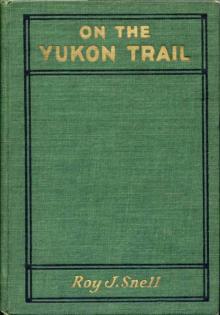 On the Yukon Trail
On the Yukon Trail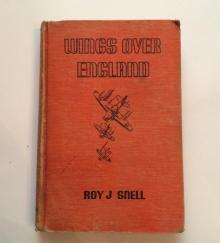 Wings over England
Wings over England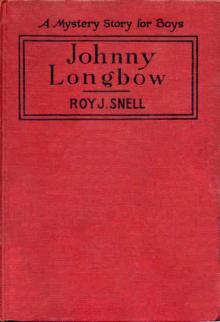 Johnny Longbow
Johnny Longbow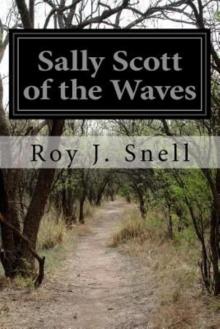 Sally Scott of the WAVES
Sally Scott of the WAVES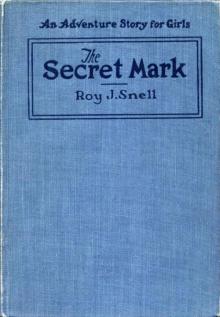 The Secret Mark
The Secret Mark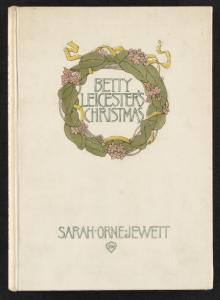 Betty Leicester's Christmas
Betty Leicester's Christmas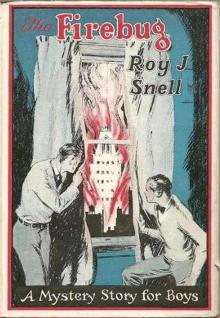 The Firebug
The Firebug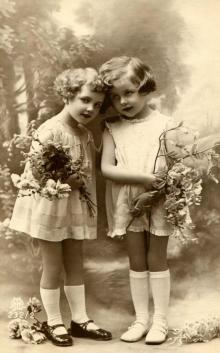 Minnie Brown; or, The Gentle Girl
Minnie Brown; or, The Gentle Girl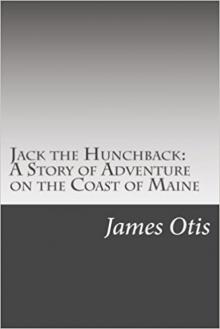 Jack the Hunchback: A Story of Adventure on the Coast of Maine
Jack the Hunchback: A Story of Adventure on the Coast of Maine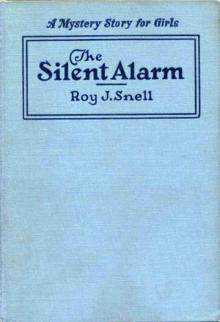 The Silent Alarm
The Silent Alarm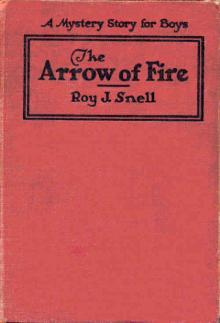 The Arrow of Fire
The Arrow of Fire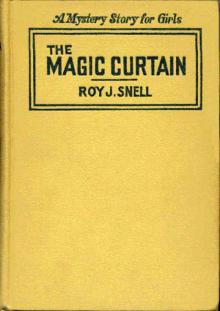 The Magic Curtain
The Magic Curtain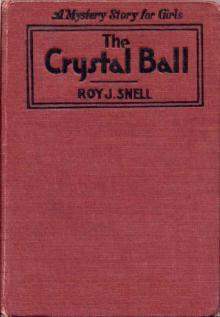 The Crystal Ball
The Crystal Ball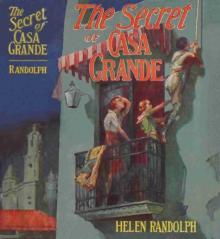 The Secret of Casa Grande
The Secret of Casa Grande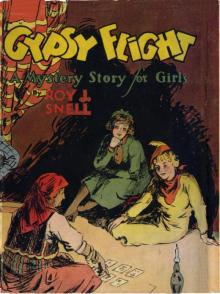 Gypsy Flight
Gypsy Flight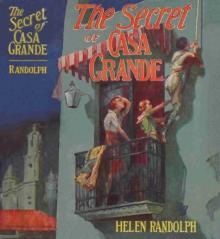 The Mystery of Carlitos
The Mystery of Carlitos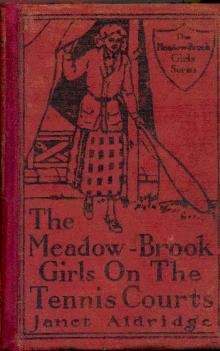 The Meadow-Brook Girls on the Tennis Courts; Or, Winning Out in the Big Tournament
The Meadow-Brook Girls on the Tennis Courts; Or, Winning Out in the Big Tournament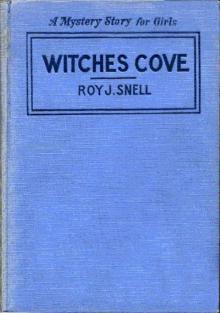 Witches Cove
Witches Cove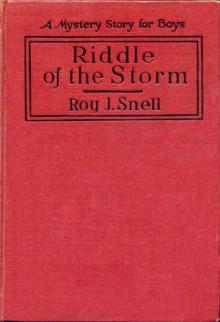 Riddle of the Storm
Riddle of the Storm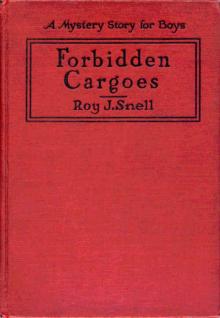 Forbidden Cargoes
Forbidden Cargoes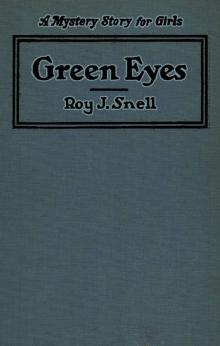 Green Eyes
Green Eyes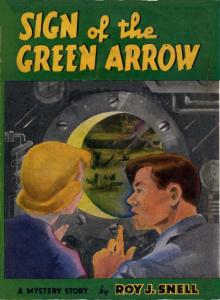 Sign of the Green Arrow
Sign of the Green Arrow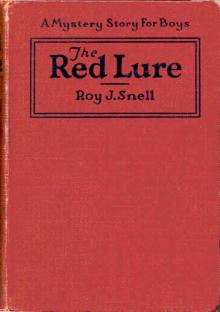 The Red Lure
The Red Lure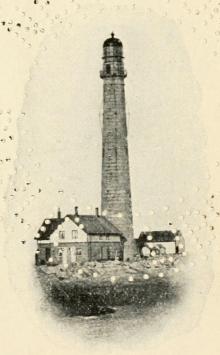 The Light Keepers: A Story of the United States Light-house Service
The Light Keepers: A Story of the United States Light-house Service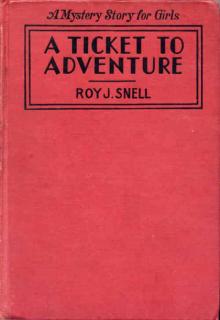 A Ticket to Adventure
A Ticket to Adventure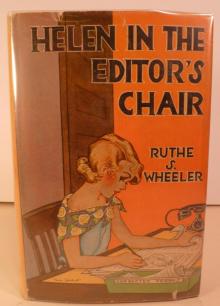 Helen in the Editor's Chair
Helen in the Editor's Chair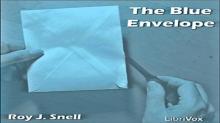 Blue Envelope
Blue Envelope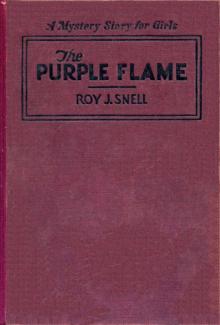 The Purple Flame
The Purple Flame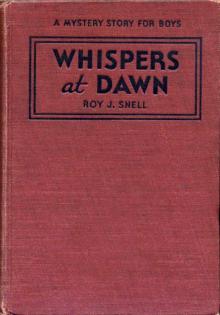 Whispers at Dawn; Or, The Eye
Whispers at Dawn; Or, The Eye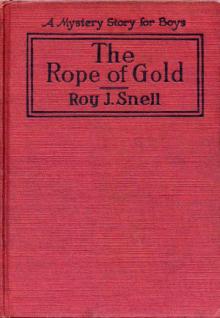 The Rope of Gold
The Rope of Gold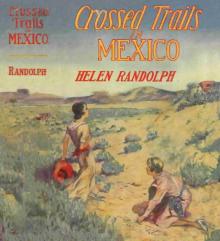 Crossed Trails in Mexico
Crossed Trails in Mexico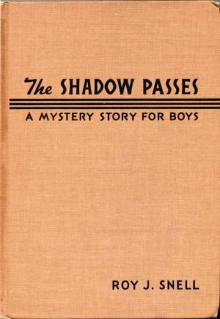 The Shadow Passes
The Shadow Passes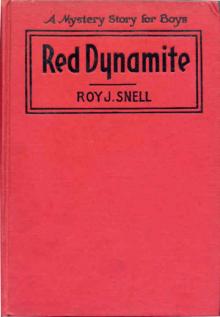 Red Dynamite
Red Dynamite Blue Grass Seminary Girls on the Water
Blue Grass Seminary Girls on the Water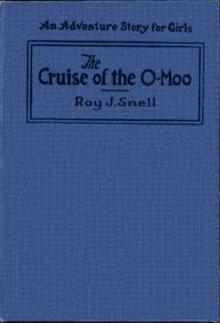 The Cruise of the O Moo
The Cruise of the O Moo